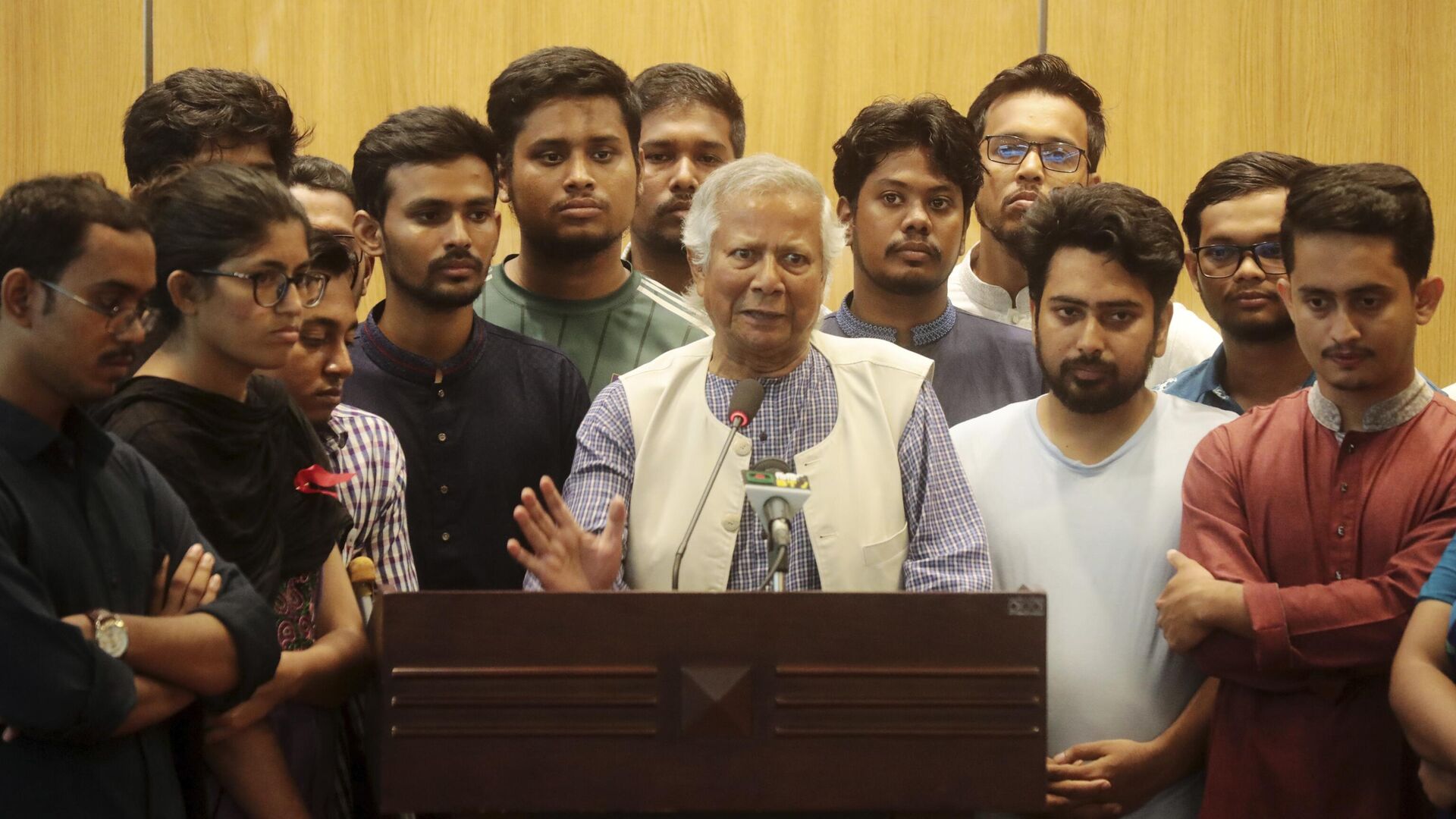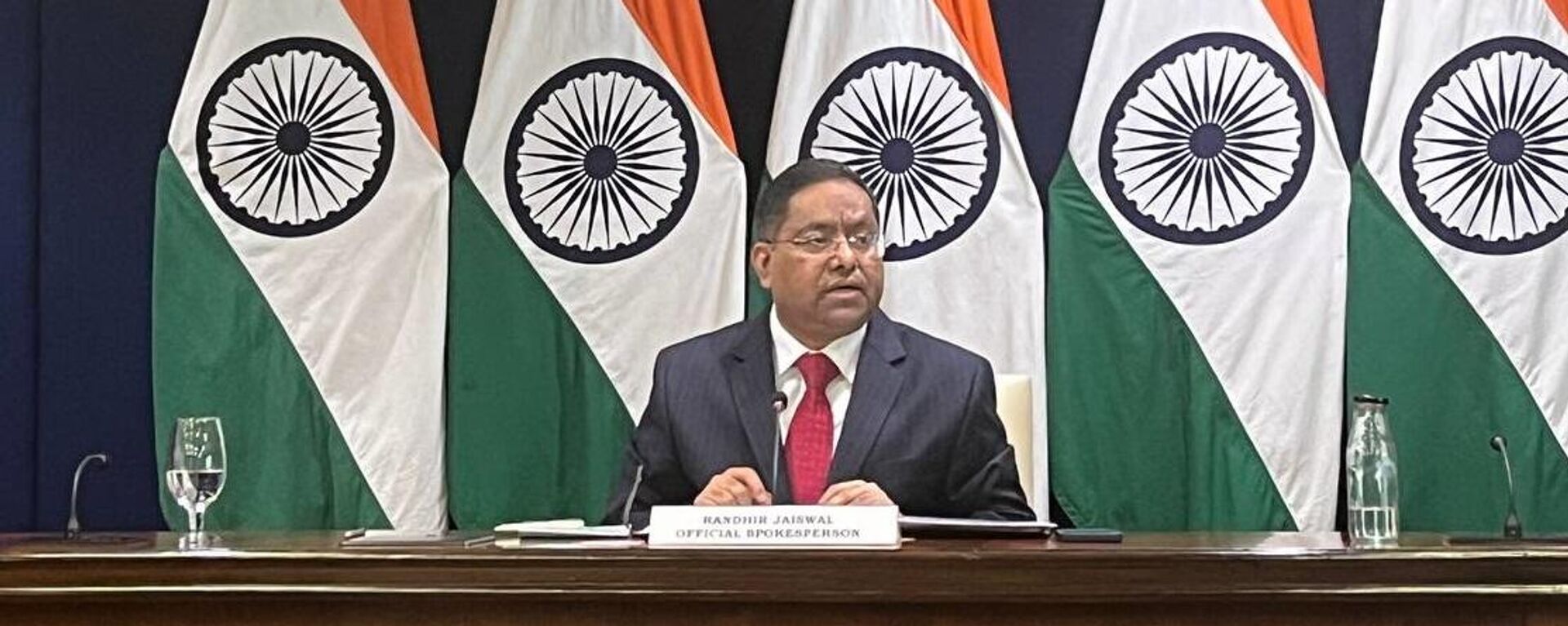https://sputniknews.in/20240809/india-eyes-a-stronger-role-in-bangladesh-amid-rising-threat-from-extremists-7990368.html
India Eyes a Stronger Role in Bangladesh amid Rising Threat from Extremists
India Eyes a Stronger Role in Bangladesh amid Rising Threat from Extremists
Sputnik India
India should play a strong role in stabilising the situation in Bangladesh, which would in the interest of not only country’s internal stability but also the larger regional security.
2024-08-09T19:51+0530
2024-08-09T19:51+0530
2024-08-10T01:21+0530
sputnik opinion
sheikh hasina
amit shah
narendra modi
india
bangladesh
dhaka
inter-services intelligence (isi)
ministry of external affairs (mea)
bangladesh nationalist party
https://cdn1.img.sputniknews.in/img/07e8/08/08/7984525_0:160:3072:1888_1920x0_80_0_0_e461258fe322f9d35e47b99e9753c9be.jpg
India should play a strong role in stabilising the situation in Bangladesh, which would in the interest of not only country’s internal stability but also the larger regional security, a Dhaka-based counter-terrorism expert and editor told Sputnik India on Friday.New Delhi should support "democratic and secular forces" in Bangladesh, which would be in the interest of Bangladeshi people and society, Salah Uddin Shoaib Choudhury, the Editor of Blitz publication, said.He highlighted that even though "definite proof" of foreign involvement in toppling the Sheikh Hasina government was yet to emerge, there is a "strong suspicion" that the coup forces were being backed and funded by Pakistan’s Inter-Services Intelligence (ISI) agency.The US Deep State had sent across a "strong signal" to India by publicly backing anti-Hasina protests and later "welcoming" the formation of an interim government, the expert suggested.He pointed towards a map doing the rounds of social media since Thursday evening, showing a map of Bangladesh with India’s 'Chicken's Neck' (Siliguri) Corridor and the states of Sikkim and West Bengal included in the Bangladeshi territory.Bangladesh Stares at Political UncertaintyFurther, the Dhaka-based analyst highlighted that Bangladesh might be starting at a spell of "political uncertainty" in coming weeks and months, as there were palpable differences between the student-led interim government and Bangladesh Nationalist Party (BNP) – Jamaat-e-Islami (JI)* coalition on when the election would be held.Choudhary said that the signals of country sliding into a hardcore neo-Islamist state were already visible.India’s Evolving Position on Bangladesh CrisisIn the meantime, New Delhi’s position on the Bangladesh situation has subtly evolved from the initial days of the students-led protests, when it had described the demonstration as an "internal matter" of the then Hasina government.However, on Tuesday, a day after Hasina fled to New Delhi on a military chopper, External Affairs Minister (EAM) S Jaishankar told the Parliament that India was deeply concerned about the developments in Bangladesh, including violence against minorities.Meanwhile, on Thursday, PM Modi urged Bangladesh's Interim Chief Advisor Muhammad Yunus to ensure safety and security of minorities. On the day, Indian Home Minister Amit Shah has announced a new committee to monitor the situation on the Indo-Bangladesh Border (IBB), including protection of Indian citizens and Hindus in Bangladesh.The Indian committee would maintain communication channels with their counterpart authorities in Bangladesh to ensure the safety and security of Indian nationals, Hindus, and other minority communities living there. The five-member committee would be headed by ADG, BSF Eastern Command.* designated extremist group by Russia and Bangladesh
https://sputniknews.in/20240808/india-closely-analysing-foreign-role-in-toppling-of-hasina-mea-7986428.html
india
bangladesh
dhaka
pakistan
south asia
west bengal
russia
Sputnik India
feedback.hindi@sputniknews.com
+74956456601
MIA „Rossiya Segodnya“
2024
Dhairya Maheshwari
https://cdn1.img.sputniknews.in/img/07e6/0c/13/138962_0:0:641:640_100x100_80_0_0_2cb44360dbcdf6d84bf4b299cd045917.jpg
Dhairya Maheshwari
https://cdn1.img.sputniknews.in/img/07e6/0c/13/138962_0:0:641:640_100x100_80_0_0_2cb44360dbcdf6d84bf4b299cd045917.jpg
News
en_IN
Sputnik India
feedback.hindi@sputniknews.com
+74956456601
MIA „Rossiya Segodnya“
Sputnik India
feedback.hindi@sputniknews.com
+74956456601
MIA „Rossiya Segodnya“
Dhairya Maheshwari
https://cdn1.img.sputniknews.in/img/07e6/0c/13/138962_0:0:641:640_100x100_80_0_0_2cb44360dbcdf6d84bf4b299cd045917.jpg
bangladesh india relations, india bangladesh ties, bangladesh india border, attacks on hindus in bangladesh, cia regime change, us regime change in bangladesh, awami league news, hasina news, hasina coup, hasina us visa, us involvement in bangladesh, jaishankar on bangladesh, mohammad yunus
bangladesh india relations, india bangladesh ties, bangladesh india border, attacks on hindus in bangladesh, cia regime change, us regime change in bangladesh, awami league news, hasina news, hasina coup, hasina us visa, us involvement in bangladesh, jaishankar on bangladesh, mohammad yunus
India Eyes a Stronger Role in Bangladesh amid Rising Threat from Extremists
19:51 09.08.2024 (Updated: 01:21 10.08.2024) India's Ministry of Home Affairs has formed a new committee to monitor the situation at India-Bangladesh border and to coordinate with Dhaka on security of Indian citizens and minorities in the country. This comes a day after PM Modi asked Bangladesh’s Interim Chief Advisor Muhammad Yunus to ensure safety and security of Hindus.
India should play a strong role in stabilising the situation in Bangladesh, which would in the interest of not only country’s internal stability but also the larger regional security, a Dhaka-based counter-terrorism expert and editor told Sputnik India on Friday.
New Delhi should support "democratic and secular forces" in Bangladesh, which would be in the interest of Bangladeshi people and society, Salah Uddin Shoaib Choudhury, the Editor of Blitz publication, said.
"The recent developments in Bangladesh have very little or nothing to do with bringing in democracy, as the US has been claiming. The interim government which took charge yesterday is backed by radical Islamist forces, which have been calling for implementing Sharia in the country," stated Choudhury in a conversation with Sputnik India.
He highlighted that even though "definite proof" of foreign involvement in toppling the Sheikh Hasina government was yet to emerge, there is a "strong suspicion" that the coup forces were being backed and funded by Pakistan’s Inter-Services Intelligence (ISI) agency.
The US Deep State had sent across a "strong signal" to India by publicly backing anti-Hasina protests and later "welcoming" the formation of an interim government, the expert suggested.
"I feel that the US has punished India for not following its diktat and rather adhering to the policy of strategic autonomy, particularly after Prime Minister Modi’s recent visit to Russia. The consequences for the country of the Deep State-ISI game plan will be far-fetched. Essentially, this is an American blueprint of de-stabilizing and disintegrating (breaking-away) India," asserted Choudhury.
He pointed towards a map doing the rounds of social media since Thursday evening, showing a map of Bangladesh with India’s 'Chicken's Neck' (Siliguri) Corridor and the states of Sikkim and West Bengal included in the Bangladeshi territory.
"It is being shared widely and even endorsed by supporters of BNP and the Islamist movement," the counter-terrorism expert stated. "Given India’s close relations with the US, I believe that it should take this matter up, if it already hasn’t done so till now."
Bangladesh Stares at Political Uncertainty
Further, the Dhaka-based analyst highlighted that Bangladesh might be starting at a spell of "political uncertainty" in coming weeks and months, as there were palpable differences between the student-led interim government and Bangladesh Nationalist Party (BNP) – Jamaat-e-Islami (JI)* coalition on when the election would be held.
He stated that some influential sections of Muhammad Yunus-led Interim Government, sworn-in on Thursday evening, wanted the government to last six years in order to carry out their stated agenda of "nation-rebuilding". The BNP, meanwhile, was in favour of holding polls at the earliest date, as hinted by its Acting President Tareeq Zia at a rally in Dhaka this week.
Choudhary said that the signals of country sliding into a hardcore neo-Islamist state were already visible.
"We are already seeing widespread attacks on Hindu minorities taking place across the country. On the other hand, the Islamic Constitution movement, an umbrella group comprising radical forces, have been holding a massive demonstration in Dhaka demanding an imposition of Islamic rule," the expert noted.
India’s Evolving Position on Bangladesh Crisis
In the meantime, New Delhi’s position on the Bangladesh situation has subtly evolved from the initial days of the students-led protests, when it had described the demonstration as an "internal matter" of the then Hasina government.
However, on Tuesday, a day after Hasina fled to New Delhi on a military chopper, External Affairs Minister (EAM) S Jaishankar told the Parliament that India was deeply concerned about the developments in Bangladesh, including violence against minorities.
Following that Ministry of External Affairs (MEA) spokesperson Randhir Jaiswal told a press briefing that New Delhi has always priortised the interests of Bangladeshi people.
Meanwhile, on Thursday, PM Modi urged Bangladesh's Interim Chief Advisor Muhammad Yunus to ensure safety and security of minorities. On the day, Indian Home Minister Amit Shah has announced a new committee to monitor the situation on the Indo-Bangladesh Border (IBB), including protection of Indian citizens and Hindus in Bangladesh.
The Indian committee would maintain communication channels with their counterpart authorities in Bangladesh to ensure the safety and security of Indian nationals, Hindus, and other minority communities living there. The five-member committee would be headed by ADG, BSF Eastern Command.
* designated extremist group by Russia and Bangladesh



